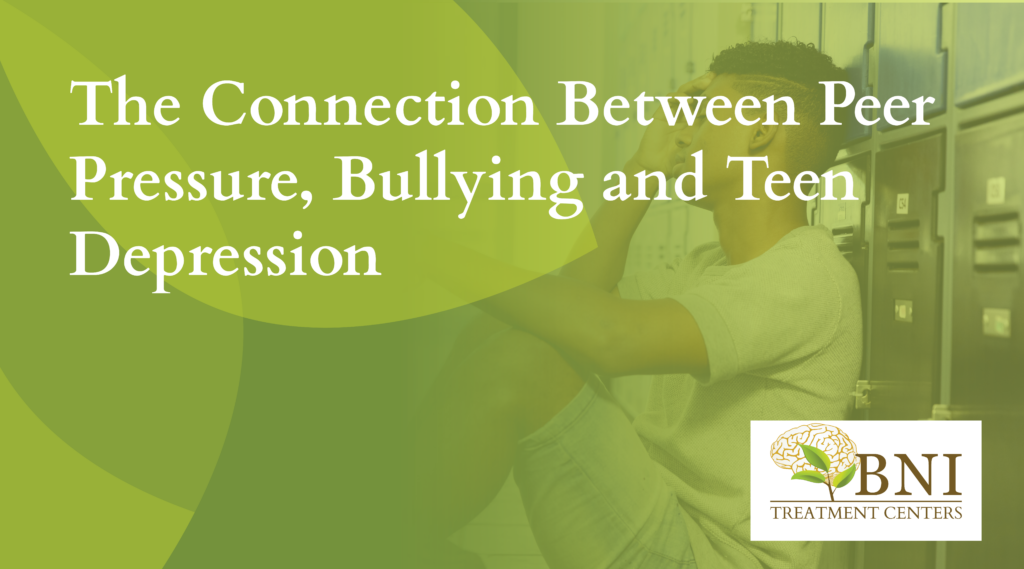
Adolescence is a pivotal time that is often marked by significant emotional and social development. During this time, relationships with peers become increasingly influential, and the desire for acceptance leads teens to conform to group norms. Sometimes even at the expense of their own well-being. Peer pressure, which can be defined as influence by peers to encourage overall conformity, can manifest in various forms – from subtle suggestions to overt coercion.
In California, the prevalence of depression among adolescents is a growing concern. According to the National Health and Nutrition Examination Survey conducted between August 2021 and August 2023, 19.2% of individuals aged 12–19 experienced depression in the past two weeks. This statistic underscores the importance of understanding the factors that contribute to adolescent mental health challenges.
At BNI Treatment Center, we understand how the constant pressure to fit in with the crowd coincides with the fear of social rejection to quickly create an environment where teens feel trapped and unable to express their true selves.
Studies show that peer pressure can lead teens to engage in behaviors that are incongruent with their values and interests, such as substance use, academic dishonesty, or social exclusion of others. These actions, when driven by the need for acceptance of one’s peers, often result in feelings of guilt, anxiety, and an overall diminished self-worth. Over time, the internal conflict between personal values and peer-influenced actions can also contribute to the development of depressive symptoms.
Why Depression and Anxiety Heighten Susceptibility to Peer Pressure
Emotional turmoil can become a vicious cycle: as peer pressure contributes to rising levels of anxiety and depression, teens become more vulnerable to the influence of their peers. When a teen is already coping with feelings of isolation, insecurity, and low self-worth, the desire to be accepted becomes even more intense, and the fear of rejection even more paralyzing.
Research shows that teen depression can impair judgment, reduce confidence, and chip away at their ability to advocate for themselves. They may even begin to believe that standing up for their own values and beliefs can push people even further away. Rather than risk being excluded, they may instead go along with behaviors that they know are harmful, whether that’s using substances, skipping school, bullying others, or staying silent in situations in which they would usually project courage.
Anxiety also plays a powerful role in this susceptibility. Teens with chronic anxiety often have an exaggerated fear of being judged and criticized. Even minor social interactions feel overwhelming, and the thought of confrontation by saying no to a friend can trigger panic attacks. As a result, anxious teens may conform not out of agreement, but out of desperation to avoid conflict and disapproval.
Neuroscience supports this dynamic. The adolescent brain is still developing, particularly in regions responsible for emotional regulation, impulse control, and social reasoning. This developmental stage makes teens more reactive to social cues and more sensitive to perceived threats to their social status.
Unfortunately, the short-term relief of fitting in often comes at the cost of long-term emotional health. Participating in behaviors that conflict with a teen’s values and priorities can deepen their feelings of shame, intensify depressive episodes, and reinforce their anxious thought patterns. This can make them even more dependent on external validation – again, perpetuating the cycle of peer pressure and emotional distress.
Understanding this feedback loop is one of the most essential aspects to improving your teen’s mental health. When parents, caregivers, and educators recognize how internal battles like anxiety and depression can affect a teen’s social decision-making, they’re better equipped to support them with empathy and appropriate intervention.

Warning Signs That Peer Pressure or Bullying Is Impacting Your Teen’s Mental Health
It’s also essential for parents to recognize the signs of peer pressure and its potential impact on a teen’s mental health. While some teens may openly express their emotions, others may internalize the stress, making it harder for caregivers to identify what’s actually happening beneath the surface. Early indicators that peer dynamics are harming a teen include:
- Sudden shifts in mood or behavior: Things such as increased irritability, sadness, anxiety, and anger (especially after social interactions and time spent online) can be a red flag.
- Withdrawal from family or friends: A once-social teen who suddenly prefers isolation, or one who avoids once-enjoyed activities, may be coping with emotional distress caused by peer rejection or bullying.
- Changes in appearance or personality to “fit in”: Teens under pressure may alter their clothing, interests, and even personality traits in order to gain acceptance with their peers. Sometimes this can lead to losing touch with their authentic identity in the process.
- Drop in academic performance: Having problems focusing in class, skipping school, or a noticeable decline in grades can also reflect internal distress related to peer pressure and social anxiety.
- Unexplained physical complaints: Stomachaches, headaches, or fatigue can sometimes be physical manifestations of chronic stress and emotional suppression.
- Risk-taking or out-of-character behavior: Giving in to peer pressure can sometimes lead teens to experiment with substances, engage in reckless behavior, or participate in bullying behavior to gain approval.
If you’re seeing one or more of these signs, it’s important not to dismiss them as just typical teenage behavior. Teens may not always have the language or confidence to express exactly what they’re feeling and experiencing – and without intervention, these pressures can contribute to long-term mental health challenges.
Open communication, fostering self-esteem, and creating supportive environments can empower your teen to make their own choices and resist negative peer influences. When teens feel safe, heard, and valued at home and in school, they’re better equipped to navigate the complex nature of social dynamics without compromising their mental well-being.

Supporting Your Teen Through Peer-Related Stress and Mental Health Challenges
Navigating the emotional minefield of peer dynamics can be overwhelming for anyone, especially for teens. But with the right support, they don’t have to face it alone. One of the most powerful tools a parent or caregiver can use is consistent and judgment-free communication. Create a space for open dialogue – validate their experiences, and resist the urge to fix everything. Sometimes, just listening is enough to make them feel seen and supported.
It’s also important to model healthy emotional responses in your own life and show them that it really is okay to set boundaries, even when it comes to friends. Helping your learn teen how to identify and express their feelings can also help them build emotional intelligence and resilience, which are going to be their key defenses against the effects that come with peer pressure and bullying.
Encouraging healthy coping skills like journaling, physical activity, mindfulness practices, and creative expression is also useful for helping teens better regulate stress and emotions. And when emotional distress persists or begins to interfere with their daily life, seeking professional help is not only appropriate — it’s essential.
Evidence-Based Treatment for Teen Depression at BNI Treatment Centers
At BNI Treatment Centers, we understand how deeply peer pressure, bullying, and emotional challenges can affect a teen’s mental health. That’s why our evidence-based approach goes beyond the basics – combining psychiatric care, individual and group therapy, and holistic modalities in a setting designed to foster healing and resilience. Our psychiatrists are intimately involved in each teen’s treatment plan from day one, ensuring continuity of care and deep clinical insight throughout their stay.
As a small, intimate facility, we’re able to provide highly personalized attention, creating a safe and structured environment where teens can truly be seen and supported. We treat depression, anxiety, trauma, co-occurring disorders, and more. All with round-the-clock nursing care and full medical detox and MAT services for teens in need.
Education is also a key part of our support system. When teens need to step away from school to focus on their health, we help them stay on track academically. And once they’re ready, our step-down Intensive Outpatient Program (IOP) ensures a seamless transition as they continue building on the progress they’ve made in residential care.
If your teen is showing signs of distress, don’t wait. Call us today at (888) 522-1504 to learn more about our treatment for depression in teens. Early intervention can make all the difference.
BNI Treatment Centers: Science-based, evidence-backed, compassion-led.




